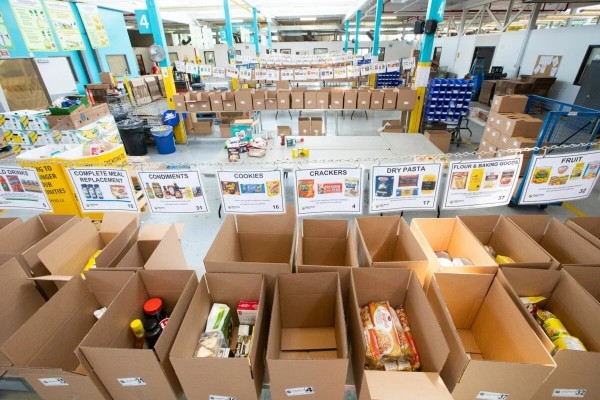Predatory capitalism: Neo-mercantilism and the Canadian economy
The Trump administration is not interested in ‘free’ or ‘fair’ trade because it does not see the world in this kind of way

Uncle Sam’s growth from toddler to giant of the world stage. Illustration by Victor Gillam.
The Canadian press is filled with a sense of paused foreboding. Polls ask which party might better address Trump and the American alt-right’s near complete stranglehold on the US federal government. Memes reflect an oddly brash nationalism trying to assert a Canadian victory in a “trade war” brought on by the US. All the while, stories circulate daily about the deleterious effects of threatened tariffs. As just about everyone can see, the response has been pretty mixed. The left-leaning NDP seems stymied and more focused on disentangling itself from a two year-long Commons voting pact with the ruling Liberals, whose leadership contenders fall all over themselves trying to look tougher than the others. For their part, Canada’s conservatives seem deeply divided. Alberta Premier Danielle Smith and Ontario Premier Doug Ford’s public disagreements on strategies are a case in point. Ford has tried to adopt a Liberal-like “Team Canada” line while Smith has decided that the route to her further electoral success is to blame Justin Trudeau while she prostrates herself before Trump. Federal Conservative Leader Pierre Poilievre has opted to more or less remain silent waiting to see which way the political wind blows while he reasserts his support for free markets.
What seems to have been missed in the current swirl of opinions is that Canada (and Mexico and a host of other countries) is no longer dealing with a globalizing neoliberalism that extracts surplus value from developing countries, the domestic working class, and racialized minorities. Instead, the American alt-right works with and through a different regime of capitalist accumulation that bears more affinities to the mercantilism against which Adam Smith inveighed than the neoliberal order it is in the process of supplanting. Said differently, it takes a kind of “beggar your neighbour” approach to accumulation. As the Trump administration has made clear, its aim is to use American economic (or, in other cases military) strength to force economic concessions from allies as a way of redeveloping the US economy. Like mercantilism before it, it also relies on a more naked imperialism to coerce other countries into line or, in the case of Canada and Greenland, potentially extend the boundaries of the United States to what it sees as lucrative resource rich regions that currently lie outside the US proper.
The Trump administration is not interested in “free” or “fair” trade—something in which it may not believe—because it does not see the world in this kind of way. Instead, it sees international affairs as a competition. Alliances, where these are possible, cannot be based on shared values because, in their view, shared values don’t really exist outside of what they see as largely racialized national boundaries. The importance of this, of course, is that explaining—repeatedly—the supposedly joint benefits of Canada-US trade can make little headway. The Trump administration simply doesn’t believe in it and, even if they did, they see economics in a different light. Their objective is not to reinforce globalized neoliberal capitalism but to ensure as much access as possible to the markets and resources of other countries through the more concerted use of hard power. What is more, there is no easy way to create common long-standing international rules of economic conduct because of the inherently conflictual nature of Trumpian policy.
For Canada, and for the political left, there are several implications. First, what is going on shows us that the abrogation of the North American Free Trade Agreement and its replacement by the United States-Mexico-Canada Agreement was a first step, but it will not be the last one. In effect, Canada is being presented with two choices. Canadians can voluntarily surrender their sovereignty to contribute to an expanded American empire or they can try to fight off neo-mercantilism through their own tariffs or other kinds of restrictions to attempt to force something of a draw in an undeclared trade war. Neither option is very palatable, but most political leaders seem to have opted for the latter. I am not sure what Canada should do, and this may be the best of a bad lot of choices, but Canadians and their government should realize that this is not a quick solution. Part of the Trumpist mentality is that America is fine with conflict because it is seen as something approximating a natural order. Trump and his coterie are not naïve. They fully understand that tariffs on Canadian goods will have negative effects on American consumers, driving up the costs of just about everything and running a risk, for instance, of energy shortages. Their gamble is that the US economy remains resilient enough to withstand price shocks caused by product shortages. Said differently, they are not in this for the short-run.
Second, the Canadian economy may be less well prepared for a trade war with the US for the same reason that the US government is interested in promoting it. Depending on how one dates it, more than a generation of globalized neoliberal economics have left the Canadian economy hollowed out. Canada’s sad lack of vaccine production capacity during the COVID-19 pandemic is a case in point. The Canadian economy has, of course, been dependent on the American economy for a long time. What neoliberalism brought with it was not an amplification of this dependence but shifts in domestic productive capacity, widening income disparities, and a retrenched welfare state. Put differently, the infrastructure of Canadian economic resilience is not in good shape.
Finally, there is a need for progressives to think about the nature of a response to Trumpist neo-mercantilism. The Biden interregnum provided what turns out to be a minor respite but at the cost of connecting the Democratic Party even more firmly to the fading and increasingly discredited rays of neoliberalism. Renormalizing neoliberalism cannot be the progressive response in Canada. In fact, I would argue this is a route that can only lead deeper into the political wilderness.
Andrew Nurse is Acting Director of the Canadian Studies Academic Program at Mount Allison University. He is a contributing editor to Active History and serves on the Editorial Board of Acadiensis. He lives in Sackville with his wife Mary Ellen. His published work includes the collections Dynamics and Trajectories: Canada and North America (with Michael Fox) and Beyond National Dreams: Essays on Canadian Citizenship and Nationalism (with Raymond Blake).










_01_600_400_90_s_c1.jpg)